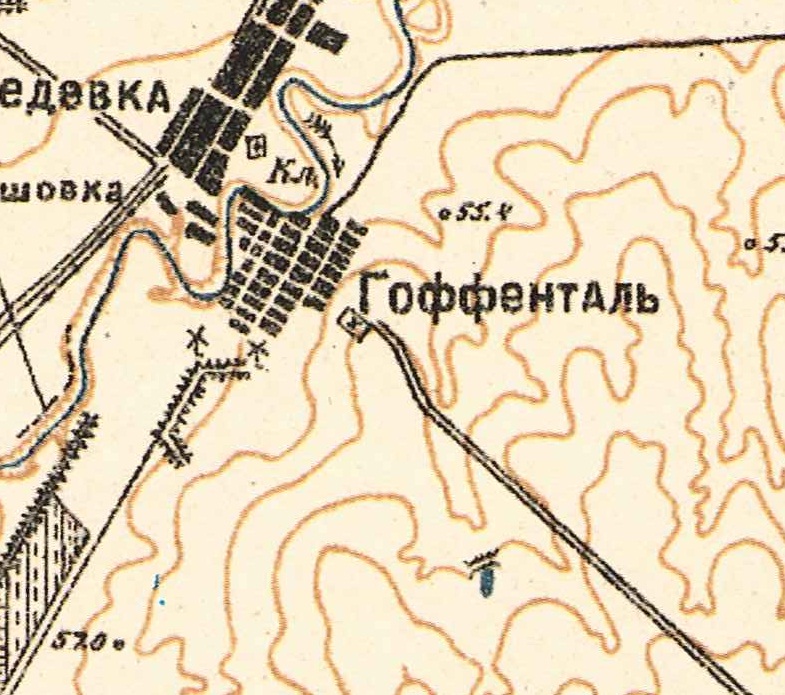Hoffental was officially founded on the left bank of the Yeruslan River in 1859 by colonists resettling from Beideck, Frank, Grimm, Hussenbach, Kolb, Norka, Schilling, and Walter. These colonists had been living there as early as 1857 and appear on an 1857 census there.
The following families settled in Hoffental:
Bartel from Walter
Bauer from Norka
Becker from Walter
Bräutigam from Kolb
Bretthauer from Walter
Dietz from Walter
Döll from Walter
Dörr from Walter
Eberlein from Walter
Eisenhut from Norka
Flath from Walter
Geist from Walter
Geisner from Schilling
Heifeneider from Norka
Heusel from Kolb
Hill from Walter
Hofmann from Walter
Kaiser from Norka
Kling from Beideck
Liphardt from Norka
Meier from Walter
Meisner from Grimm
Mohr from Norka
Mohrlang from Walter
Pfeiff from Frank
Rothenberger from Hussenbach
Schilling from Hussenbach
Schneidmüller from Hussenbach
Scholl from Walter
Stärkel from Norka
Steinmetz from Walter
Vogel from Walter
Volk from Walter
Weber from Walter
Wiederspahn from Walter
As part of the Russification efforts in the region, Hoffental was renamed Zhdanovka in 1915, but was again called Hoffental during the period in which the Autonomous Soviet Socialist Republic of the Volga Germans existed (1924-1941).
On 2 July 1942, the former daughter colony of Hoffental was officially renamed back to Zhdanovka.
The original colonists of Hoffental were Lutheran. The Lutheran congregation in Hoffental was part of the parish headquartered in nearby Schöndorf and was served by the pastor who lived there. The congregation in Hoffental became an independent Lutheran parish in 1905 with a resident pastor.
In the first decades after the founding of the colony, worship services were performed in the Bethaus (a combined school/church building). In 1889, the colonists of Hoffental acquired the old wooden Catholic church in the colony of Louis and used the lumber to construct a new Lutheran Church on a stone foundation in Hoffental. The reconstruction of the church was overseen by V.S. Andreev who lived in Katharinenstadt. The exact date of the completion of the construction of the new church in Hoffental is unknown, but presumed to be 1890.
As of 1908, the congregation in Hoffental numbered 1,411 parishioners.
During the 1930s, the Hoffental Lutheran Church was closed by the Soviet authorities.
|
Year
|
Households
|
Population
|
||
|---|---|---|---|---|
|
Total
|
Male
|
Female
|
||
| 1859 |
25
|
221
|
119
|
102
|
| 1872 | 444 | |||
| 1883 |
|
736
|
|
|
| 1888 |
159
|
699
|
356
|
343
|
| 1897 |
|
574*
|
289
|
285
|
| 1905 |
|
1,245
|
|
|
| 1908 |
145
|
1,386
|
696
|
690
|
| 1910 | 195 | 1,460 | 739 | 721 |
| 1912 |
|
1,511
|
|
|
| 1920 |
182
|
1,210
|
|
|
| 1922 |
|
846
|
|
|
| 1926 |
161
|
848
|
404
|
444
|
| 1931 | 1,098** | |||
*Of whom 561 were German.
** Of whom 1049 were German.
Hoffental (Wolgadeutsche.net) - in Russian
How Many Schillings Are There? (Gary Martens)
- Diesendorf, V.F. Die Deutschen Russlands : Siedlungen und Siedlungsgebiete : Lexicon. Moscow, 2006.
- Koch, Fred C. The Volga Germans: In Russia and the Americas, from 1763 to the Present (University Park: Pennsylvania State University Press, 1977): 312.
- Preliminary Results of the Soviet Census of 1926 on the Volga German Autonomous Soviet Socialist Republic (Pokrovsk, 1927): 28-83.
- Schnurr, Joseph. Die Kirchen und das religiöse Leben der Russlanddeutschen – Evangelischer Teil (Stuttgart: AER Verlag Landsmannschaft der Deutschen aus Rußland, 1978): 351.
- "Settlements in the 1897 Census." Journal of the American Historical Society of Germans from Russia (Winter, 1990): 16.
The following resources are available for those researching the families of Hoffental:
- 1857 Hoffental Census.
51.066667, 47.15
Migrated From
Immigration Locations

Map of Hoffental (1935).